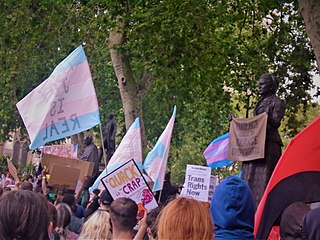
Non-binary and genderqueer are umbrella terms for gender identities that are not solely male or female. Non-binary identities often fall under the transgender umbrella since non-binary people typically identify with a gender that is different from the sex assigned to them at birth, though some non-binary people do not consider themselves transgender.
Gender neutrality, also known as gender-neutralism or the gender neutrality movement, is the idea that policies, language, and other social institutions should avoid distinguishing roles according to people's sex or gender. This is in order to avoid discrimination arising from the impression that there are social roles for which one gender is more suited than another. The disparity in gender equality throughout history has had a significant impact on many aspects of society, including marketing, toys, education and parenting techniques. In order to increase gender neutrality in recent years, there has been a societal emphasis on utilizing inclusive language and advocating for equality.
The following outline is provided as an overview of and topical guide to transgender topics.
The gender binary is the classification of gender into two distinct forms of masculine and feminine, whether by social system, cultural belief, or both simultaneously. Most cultures use a gender binary, having two genders.
In the United States, the rights of transgender people vary considerably by jurisdiction. In recent decades, there has been an expansion of federal, state, and local laws and rulings to protect transgender Americans; however, many rights remain unprotected, and some rights are being eroded. Since 2020, there has been a national movement by conservative/right-wing politicians and organizations to target transgender rights. There has been a steady increase in the number of anti-transgender bills introduced each year, especially in Republican-led states.

Lesbian, gay, bisexual, and transgender (LGBT) people in the U.S. state of Oregon have the same legal rights as non-LGBT people. Same-sex sexual activity is legal in Oregon, and same-sex marriage has been legal in the state since May 2014 when a federal judge declared the state's ban on such marriages unconstitutional. Previously, same-sex couples could only access domestic partnerships, which guaranteed most of the rights of marriage. Additionally, same-sex couples are allowed to jointly adopt, and discrimination based on sexual orientation and gender identity in the areas of employment, housing and public accommodations is outlawed in the state under the Oregon Equality Act, enacted in 2008. Conversion therapy on minors is also illegal.

This article addresses the history of transgender people in the United States from prior to Western contact until the present. There are a few historical accounts of transgender people that have been present in the land now known as the United States at least since the early 1600s. Before Western contact, some Native American tribes had third gender people whose social roles varied from tribe to tribe. People dressing and living differently from the gender roles typical of their sex assigned at birth and contributing to various aspects of American history and culture have been documented from the 17th century to the present day. In the 20th and 21st centuries, advances in gender-affirming surgery as well as transgender activism have influenced transgender life and the popular perception of transgender people in the United States.
Discrimination against non-binary people, people who do not identify exclusively as male or female, may occur in social, legal, or medical contexts.
Feminist views on transgender topics vary widely.

The following outline offers an overview and guide to LGBT topics.
The participation of transgender people in competitive sports, a traditionally sex-segregated institution, is a controversial issue, particularly the inclusion of transgender women and girls in women's sports.
Accounts of transgender people have been identified going back to ancient times in cultures worldwide. The modern terms and meanings of transgender, gender, gender identity, and gender role only emerged in the 1950s and 1960s. As a result, opinions vary on how to categorize historical accounts of gender-variant people and identities.

Multiple countries legally recognize non-binary or third gender classifications. These classifications are typically based on a person's gender identity. In some countries, such classifications may only be available to intersex people, born with sex characteristics that "do not fit the typical definitions for male or female bodies."

Transgender rights in the United Kingdom have varied significantly over time, with transgender Britons facing many issues not experienced by non-trans individuals. These include various laws and public attitudes in regards to identity documents, as well as anti-discrimination measures used by or pertaining to transgender people, in the areas of employment, education, housing and social services, amongst others.

Transgender and travesti rights in Argentina have been lauded by many as some of the world's most progressive. The country "has one of the world's most comprehensive transgender rights laws": its Gender Identity Law, passed in 2012, made Argentina the "only country that allows people to change their gender identities without facing barriers such as hormone therapy, surgery or psychiatric diagnosis that labels them as having an abnormality". In 2015, the World Health Organization cited Argentina as an exemplary country for providing transgender rights. Leading transgender activists include Lohana Berkins, Diana Sacayán, Mariela Muñoz, María Belén Correa, Marlene Wayar, Claudia Pía Baudracco, Susy Shock and Lara Bertolini.
The legal and regulatory history of transgender and transsexual people in the United States begins in the 1960s. Such legislation covers federal, state, municipal, and local levels, as well as military justice. It reflects broader societal attitudes which have shifted significantly over time and have impacted legislative and judicial outcomes.

The regulations regarding the service of intersex people in the United States Armed Forces are vague and inconsistent due to the broad nature of humans with intersex conditions. The United States Armed Forces as a whole does not officially ban intersex people from service but does exclude many based on the form of their status. Policies regarding all intersex people are not addressed formally although depending on the type of sex variation some intersex people are allowed to serve. The United States military and their requirements for service makes it so they are frequently in a unique predicament when it comes to intersex bodies. With their position of needing to discern between male and female bodies, they are exposed to a broad variety of people, such as those who are intersex whose bodies may not match either classification and are more difficult to make decisions on. This ambiguity leads to confusion regarding military medical, behavioral, and legal laws.

Dana Alix Zzyym is an intersex activist and veteran of the U.S. Navy. After the culmination of a six-year legal battle, they became the first U.S. citizen to receive an official U.S. passport with an "X" sex/gender marker.
The following is a timeline of transgender history. Transgender history dates back to the first recorded instances of transgender individuals in ancient civilizations. However, the word transgenderism did not exist until 1965 when coined by psychiatrist John F. Oliven of Columbia University in his 1965 reference work Sexual Hygiene and Pathology; the timeline includes events and personalities that may be viewed as transgender in the broadest sense, including third gender and other gender-variant behavior, including ancient or modern precursors from the historical record.

Legal gender, or legal sex, is a sex or gender that is recognized under the law. Biological sex, sex reassignment and gender identity are used to determine legal gender. The details vary by jurisdiction. Legal gender identity is fundamental to many legal rights and obligations, including access to healthcare, work, and family relationships, as well as issues of personal identification and documentation. The complexities involved in determining legal gender, despite the seeming simplicity of the underlying principles, highlight the dynamic interaction between biological characteristics, self-identified gender identity, societal norms, and changing legal standards. Because of this, the study of legal gender is a complex field that is influenced by cultural, historical, and legal factors. As such, a thorough investigation is necessary to fully understand the subject's implications and breadth within a range of legal systems and societies.










